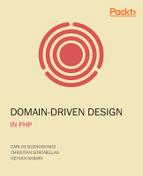Consider a Product Entity that contains a Money Value Object used to quantify its price. Additionally, consider two Product Entities with an identical price — for example 100 USD. This scenario could be modeled using the two individual Money objects or two references pointing to a single Value Object.
Sharing the same Value Object can be risky; if one is altered, both will reflect the change. This behavior can be considered an unexpected side effect. For example, if Carlos was hired on February 20, and we know that Christian was also hired on the same day, we may set Christian's hire date to be the same instance as Carlos's. If Carlos then changes the month of his hire date to May, Christian's hire date changes too. Whether it's correct or not, it's not what people expect.
Due to the problems highlighted in this example, when holding a reference to a Value Object, it's recommended to replace the object as a whole rather than modifying its value:
$this−>price = new Money(100, new Currency('USD'));
//...
$this->price = $this->price->increaseAmountBy(200);
This kind of behavior is similar to how basic types such as strings work in PHP. Consider the function strtolower. It returns a new string rather than modifying the original one. No reference is used; instead, a new value is returned.
